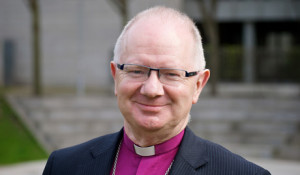
By Sarah Mac Donald - 25 April, 2016

Archbishop Richard Clarke, Church of Ireland Primate of All Ireland.
The leader of the Church of Ireland has called for a wider and generous remembering around the narrative of 1916 in his sermon for a special commemorative service at St Patrick’s Cathedral in Dublin on Sunday.
In his address, Archbishop Richard Clarke told the congregation of state and religious representatives that emphasis is now rightly being given to the more than two hundred people who died in crossfire simply by being in ‘the wrong place’.
This figure, he noted, included some forty children, some of whom were very young.
“We remember this, not for reasons of vituperation or for the apportioning of blame, but simply as the reminder that nobody has a monopoly on victimhood,” he said.
Acknowledging that there is rhetoric in the Proclamation, Archbishop Clarke said it also contained aspiration in the style of the American Constitution, “envisioning a state which is to provide equal rights and equal opportunities to all its citizens, and declares its resolve to pursue the happiness and prosperity of the whole nation and of all its parts, cherishing all of the children of the nation equally”.
He warned that a celebration which does not recognise the abject failures to follow through on these goals, both in the reality of increasing homelessness and in a growing imbalance between those who have and those who do not have, “can scarcely claim either integrity or significance”.
He told the congregation gathered in the national cathedral that the dignity of any individual is, in the Christian understanding, paramount and imperative.
“Christian disciples believe that every human person is made in God’s image and likeness, and that there is an inherent God-bestowed dignity in every human person.”
Of the centenary of the 1916 Rising, Dr Clarke said there is “more than one narrative in 1916 and its Rising; we must live with a plurality of narratives, or our commemoration is a self-serving and disingenuous pretence.”
He added, “This single narrative pretence is a place we all have known so well in the history of this country. It is a place where, as Eavan Boland expresses it,
‘…every inch of ground
Was a new fever or a field soaked
To its grassy roots with remembered hatreds.’
The Archbishop of Armagh further commented, “What we are called to undertake – fifty years on from 1966 – is to reach out for a wider view, to discern a narrative that is both more nuanced and less politicised. I would want to call this generous remembering.”
“We must therefore recognise that the Rising was indeed one of the accelerators that accentuated the many fissures within Ireland, not simply those of national identity and adherence but also of mutually exclusive cultures, of diverging contexts and differing religious traditions.”
He said 1916 was not simply about Irish patriots and British soldiers.
“We should also seek to place the context of 1916 into the larger background of the First World War, where many convinced Irish nationalists felt impelled by conscience to fight in British uniform on the slaughter fields of Europe.”
Dr Clarke urged people to embrace the insight of Irish nationalist Tom Kettle, who was a friend of many involved in the Rising but who died in a British Army uniform.
Kettle suggested that only when Ireland looked outwards would she achieve her true potential as a nation, and achieve harmony or peace.
That challenge today, Archbishop Clarke said, was not simply looking outwards to those who may enhance our economy but looking outwards also to those who need our help and costly compassion that will make any commemoration of 1916 a worthy project.